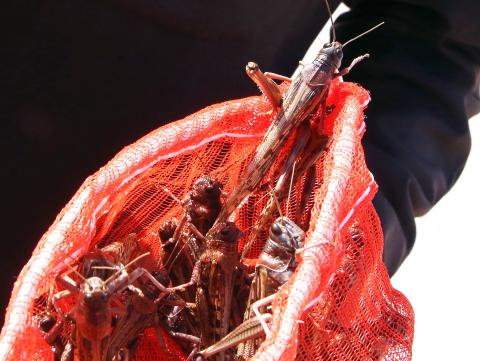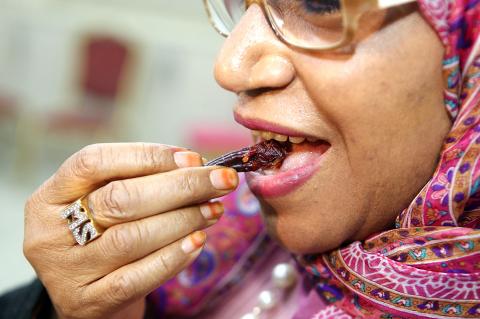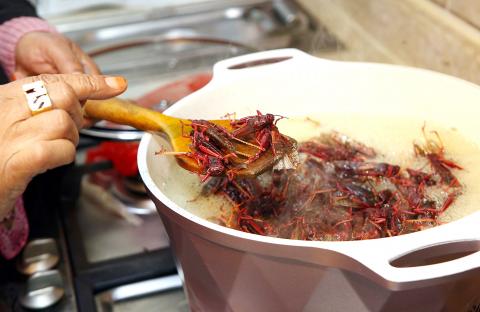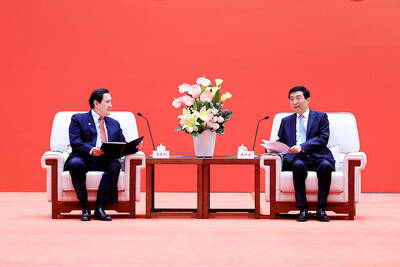Some people like them baked, others prefer them dried. Locusts are surprisingly nutritious and considered a delicacy by many in Kuwait but not everyone is enamoured by the crunchy culinary offering.
“I love their flavour, it’s one of my memories of childhood and reminds me of my grandparents and my father,” enthused Moudi al-Miftah, a 64-year-old journalist who writes a weekly newspaper column.
Miftah awaits winter every year to stock up on locusts, which she cooks herself, with a preference for crispiness.

Photo: AFP
In her kitchen, she tipped a bag of the insects into boiling stock where they quickly turned red, filling her kitchen with an aroma similar to stewing mutton.
After simmering for half an hour, the locusts are ready to eat but they can be baked for added crunch, or dried so they can be enjoyed year-round.
But most of Miftah’s loved ones stopped eating the bugs long ago.

Photo: AFP
Locust consumption is dwindling across Kuwaiti society, particularly among the younger generation, many of whom are disgusted by the prospect.
Ali Saad, a man in his twenties who was shopping for groceries, was visibly repulsed by the idea of snacking on insects.
“I’ve never thought of eating locusts,” he said. “Why would I eat an insect when we have all kinds of red and white meats?”

Photo: AFP
TASTY FLESH
Locusts are consumed in many parts of the world and are a staple of some cuisines. Experts say they are an excellent, energy-efficient source of protein.
In Kuwait, they retain a sturdy fan base among older citizens.
The first shipments, imported from Saudi Arabia, arrive in markets in January, transported in distinctive red bags weighing 250 grams.
They are stocked alongside white desert truffles, another delicacy sought by Kuwaitis in winter at the Al-Rai market nestled in an industrial area in the northwest of Kuwait City.
Abou Mohammed, 63, is originally from Ahvaz in Iran and normally sells fish at the market.
But when the season arrives, he becomes a locust and truffle salesman.
“The locusts are caught during the winter nights (when they are not flying) and we import them from Saudi Arabia,” he said.
He described the bugs as “like a shrimp” and enthused that “the flesh is very tasty — especially the females which are full of eggs”.
The larger females are known as “el-Mekn” in Kuwaiti dialect, while the smaller males are called “Asfour.”
Abou Mohammed says he sells almost a dozen bags a day at between three and five Kuwaiti dinars (US$8 and US$16) each.
“I sell some 500 bags over the season, which is from January to April,” he said.
STOCKPILING
Mohammed al-Awadi, a 70-year-old Kuwaiti, has delivered locusts to retailers for many years and keeps a handy supply of the dried insects in his pocket for snacking.
Dubbed “the king of the market,” the salesman demonstrated how to eat the bug — snacking on a first locust, then another and another.
“It’s the best of dishes. I’m full, so I don’t need to eat lunch today,” he said.
“The drier they are the better. My father always had a supply in his pocket.”
Authorities have sought in vain to ban the consumption of locusts over fears they could be contaminated.
Locusts can rapidly multiply and form swarms that damage crops, forcing some countries to tackle them with pesticides.
Adel Tariji put his stock of two black sacks beside his vehicle and prospective clients pulled up alongside to examine his produce and haggle over prices.
Tariji, who has sold locusts since he was 18, said that despite reticence from some, he had seen glimmers of interest from health-conscious younger buyers.
They are more willing to pay higher prices because they are convinced of the benefits of eating “all natural” products, he said.
“Some people are even stockpiling for next year out of fear that there will be no locusts next season.”

The canonical shot of an East Asian city is a night skyline studded with towering apartment and office buildings, bright with neon and plastic signage, a landscape of energy and modernity. Another classic image is the same city seen from above, in which identical apartment towers march across the city, spilling out over nearby geography, like stylized soldiers colonizing new territory in a board game. Densely populated dynamic conurbations of money, technological innovation and convenience, it is hard to see the cities of East Asia as what they truly are: necropolises. Why is this? The East Asian development model, with

Desperate dads meet in car parks to exchange packets; exhausted parents slip it into their kids’ drinks; families wait months for prescriptions buy it “off label.” But is it worth the risk? “The first time I gave him a gummy, I thought, ‘Oh my God, have I killed him?’ He just passed out in front of the TV. That never happens.” Jen remembers giving her son, David, six, melatonin to help him sleep. She got them from a friend, a pediatrician who gave them to her own child. “It was sort of hilarious. She had half a tub of gummies,

The wide-screen spectacle of Formula One gets a gleaming, rip-roaring workout in Joseph Kosinski’s F1, a fine-tuned machine of a movie that, in its most riveting racing scenes, approaches a kind of high-speed splendor. Kosinski, who last endeavored to put moviegoers in the seat of a fighter jet in Top Gun: Maverick, has moved to the open cockpits of Formula One with much the same affection, if not outright need, for speed. A lot of the same team is back. Jerry Bruckheimer produces. Ehren Kruger, a co-writer on Maverick, takes sole credit here. Hans Zimmer, a co-composer previously, supplies the thumping

There is an old British curse, “may you live in interesting times,” passed off as ancient Chinese wisdom to make it sound more exotic and profound. We are living in interesting times. From US President Donald Trump’s decision on American tariffs, to how the recalls will play out, to uncertainty about how events are evolving in China, we can do nothing more than wait with bated breath. At the cusp of potentially momentous change, it is a good time to take stock of the current state of Taiwan’s political parties. As things stand, all three major parties are struggling. For our examination of the